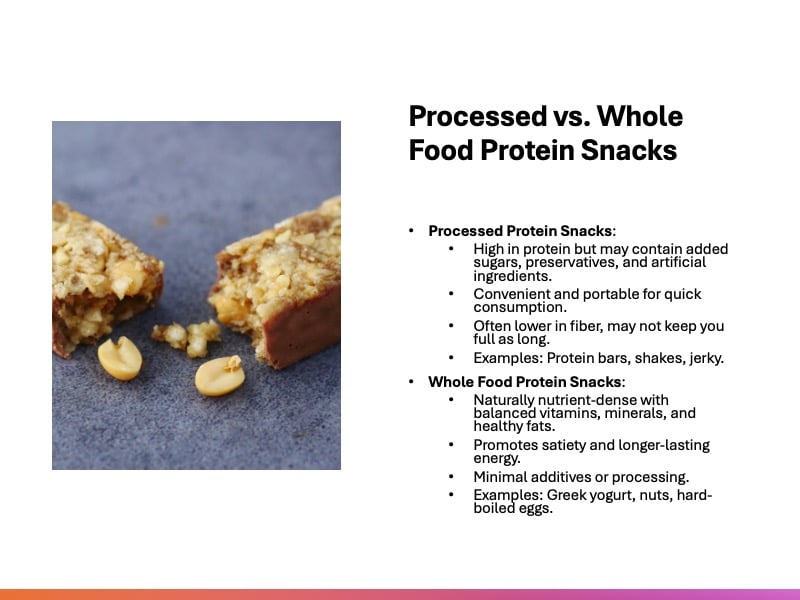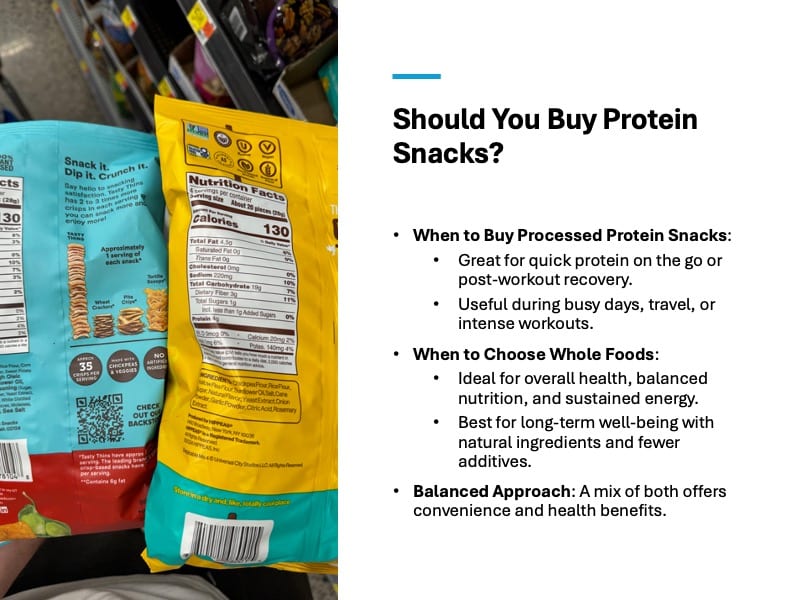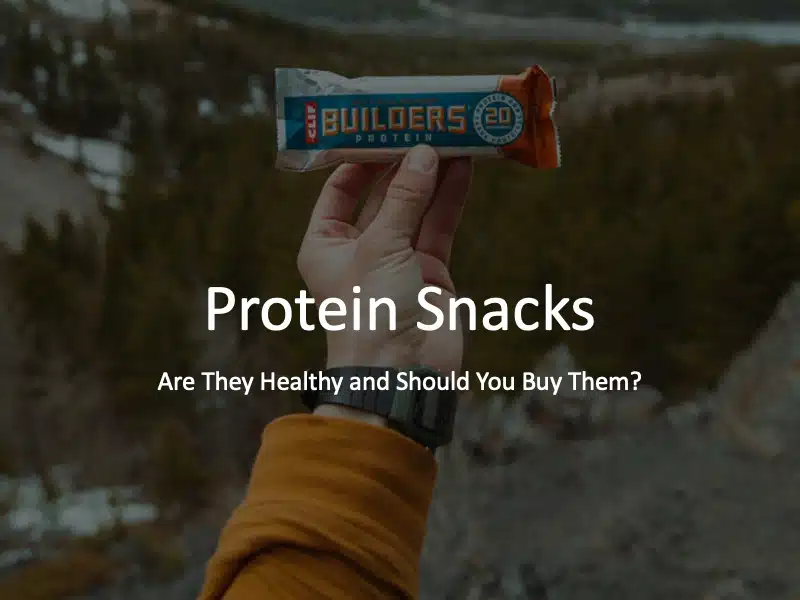Protein Snacks Review: Are Protein Snacks Good for You?
Protein snacks have exploded in popularity as people seek convenient ways to meet their daily protein needs.
From bars and shakes to nuts and yogurt, there’s no shortage of options.
But the key question remains: Are protein snacks healthy, and should you rely on them?
This article analyzes the pros and cons of protein snacks, comparing processed protein snacks with whole food alternatives to help you make the healthiest choice for your lifestyle.
What Are Protein Snacks?
Protein snacks refer to food items specifically marketed to provide a quick, accessible source of protein.
They include options like protein bars, shakes, jerky, yogurt, and more.
While they come in various forms, they serve a common purpose—to offer a protein boost when you’re on the go or need an energy pick-me-up.
Are Protein Snacks Healthy?

When assessing whether protein snacks are healthy, it’s essential to consider the type of snack you’re consuming. Not all protein snacks are created equal, and their health benefits can vary based on factors like processing, nutrient content, and added ingredients.
Processed Protein Snacks
Processed protein snacks, such as the Redd bar and other protein bars, powders, and shakes, often pack a high amount of protein in a convenient package. However, they may also contain added sugars, artificial sweeteners, preservatives, and fillers to enhance taste and prolong shelf life.
This means that while they can effectively boost protein intake, they may not always be the healthiest option.
Many protein bars, for example, may contain up to 20-30 grams of protein per serving but are also loaded with processed sugars and ingredients that provide little nutritional value beyond protein.
Additionally, processed snacks are often lower in fiber and may leave you feeling less full compared to whole-food options.
Certain healthy protein snacks, like Hippeas Chickpea Puffs, are minimally processed and still have valuable nutrient content, but many are no better than candy bars with extra protein.
This can result in frequent snacking, which may hinder weight loss or maintenance efforts.
Whole Food Protein Snacks
Whole food protein snacks are minimally processed and naturally nutrient-dense, offering not only protein but also essential vitamins, minerals, and healthy fats.
Examples of whole-food protein snacks include hard-boiled eggs, Greek yogurt, nuts, seeds, and cottage cheese.
These foods are not just protein-packed but also promote satiety, helping you stay full longer due to their balanced nutrient profile.
Whole foods also come without added sugars or artificial ingredients, making them a more wholesome choice for long-term health.
They tend to provide a steadier source of energy and support overall well-being thanks to their rich nutrient content.
Protein Snacks vs. Whole Foods: Key Comparisons
Choosing between processed protein snacks and whole food protein snacks ultimately comes down to your lifestyle, goals, and preferences. For those who prioritize convenience and need quick protein on the go, processed snacks can be beneficial when used in moderation.
However, if long-term health, satiety, and balanced nutrition are your priorities, whole food protein snacks like Greek yogurt, nuts, and eggs are a superior option.
Incorporating a mix of both processed and whole food protein snacks can give you the best of both worlds, ensuring you meet your protein needs without sacrificing overall health.
Nutritional Value
- Processed Protein Snacks: High in protein but often low in fiber and other essential nutrients. Many processed snacks are loaded with sugars, artificial flavors, and preservatives that could negatively impact long-term health.
- Whole Food Protein Snacks: Packed with natural vitamins, minerals, and healthy fats along with protein, whole food options like nuts or yogurt offer a more balanced nutrition profile that supports overall health.
Satiety
- Processed Protein Snacks: Due to their lower fiber and fat content, processed protein snacks may not keep you full as long as whole food options. This can lead to more frequent snacking and possibly overconsumption of calories.
- Whole Food Protein Snacks: Foods like nuts, seeds, and eggs are rich in protein and fiber or healthy fats, which promote satiety and prevent overeating. Whole foods tend to digest more slowly, keeping you fuller for longer.
Processing and Additives
- Processed Protein Snacks: Often contain preservatives, artificial sweeteners, and fillers to enhance flavor and shelf life. Over time, consuming a high amount of processed foods can increase your intake of artificial ingredients that may negatively impact health.
- Whole Food Protein Snacks: Minimally processed, whole food snacks contain fewer additives and are typically free of artificial preservatives, making them a cleaner source of nutrition.
Convenience
- Processed Protein Snacks: They are undoubtedly convenient and portable, making them a great option for busy individuals who need something quick, especially after workouts or during travel. However, convenience can sometimes come at the expense of quality.
- Whole Food Protein Snacks: While not always as convenient, whole foods like nuts, yogurt, or boiled eggs can still be easy to carry and consume on the go. However, some options may require refrigeration or preparation.
Should You Buy Protein Snacks?

When deciding whether to buy protein snacks, it’s important to consider your goals and dietary habits.
When to Buy Processed Protein Snacks
- Convenience: Processed protein snacks are great for when you need quick access to protein on the go. They can be especially helpful during long workdays, travel, or after intense workouts when immediate recovery is important.
- Post-Workout Recovery: Consuming a protein snack immediately after a workout can aid in muscle repair and recovery. A protein shake or bar can provide a convenient option in this scenario.
When to Opt for Whole Foods
- Overall Health: If your goal is long-term health and well-being, whole food protein snacks should be your go-to. They provide not only protein but also other essential nutrients that support your body’s needs. Whole foods like almonds, yogurt, and boiled eggs also offer sustained energy and promote satiety, helping you avoid overeating.
- Balanced Nutrition: Whole food protein snacks deliver a more complete nutritional profile, offering healthy fats, fiber, and vitamins alongside protein. This makes them an excellent option for individuals who want to maintain a balanced diet without relying heavily on processed products. For convenience, you can make yourself a post-workout smoothie with whole foods and a high protein content.
Healthiest & Best Protein Snacks (My Recommendations)
I personally prefer whole food protein snacks, and homemade trail mixes are probably my favorite.
- You can easily combine almonds, walnuts, sunflower seeds, pumpkin seeds, dried cranberries, and dark chocolate for a nutrient-dense snack that provides a balance of healthy fats, fiber, and plant-based protein.
- It’s easy to customize and perfect for long-lasting energy.
If you’re looking for healthy processed options, OWYN Shakes are my top recommendation for on-the-go protein.
They are plant-based, free from common allergens like dairy and gluten, and provide 20 grams of protein per serving, making them ideal for quick, clean nutrition.
Last update on 2025-04-16 / This article includes affiliate links/Images via Amazon Product Advertising API. I may earn commissions on purchases made through these links.
For something a little lighter, Hippeas Chickpea Puffs offer a crunchy, flavorful snack that’s not only high in protein and fiber but also gluten-free and low in calories, making them a smart, satisfying alternative to traditional chips.
Last update on 2025-04-16 / This article includes affiliate links/Images via Amazon Product Advertising API. I may earn commissions on purchases made through these links.
Read Next: Best Foods for Building Muscle Mass





